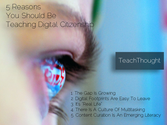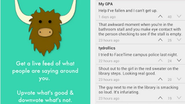-
About
- About Listly
- Community & Support
- Howto
- Chrome Extension
- Bookmarklet
- WordPress Plugin
- Listly Premium
- Privacy
- Terms
- DMCA Copyright
- © 2010-2025 Boomy Labs

 Jennifer Cirino
Jennifer Cirino
Listly by Jennifer Cirino

A little over a year ago, I blogged about Snapchat, a temporary and private photo sharing service that was getting a lot of attention. Well, Snapchat is back in the spotlight again. From competitor apps that work against the service, permanently saving the supposedly private and temporary images, to significant security hacks, this app could be a world of trouble for teens and young children.

Whether it's defending yourself from identity thieves or removing bad software from your family's computer, it's important to know how to stay safe online. Over the course of the past few months, we've explored the simple steps you can take to help keep yourself, your family and the web safer.

Once upon a time in the late 20th century, teenagers researched homework assignments at a library or with an encyclopedia pulled from the living room book shelf. They communicated privately with friends by stretching the cord of the family telephone into the bathroom.

Teenagers today are migrating away from Facebook in favor of cooler services, a new study has found. European Union-funded research on global social networking trends discovered that four contenders have emerged to topple Facebook: Twitter, Instagram, Snapchat, and WhatsApp. The comprehensive European study took 15 months to complete, and the team of researchers compiled 1,000 survey results.

The Pew Research Center Internet Project released the results of its 2013 social media report today which found that 73% of online adults use a social networking site of some kind, and 42% of adults use multiple sites. Facebook remains the dominant player, but the numbers are consistently up across Facebook, LinkedIn, Twitter, and Instagram.

Media monitoring made simple. Work smartly as team. Community management, wherever your are. Analyze your visibility.

by Paul Barnwell, Teacher of English & Digital Media Students buzzed about the latest uproar on Instagram. Anonymous sources had posted a "questionable"-and NSFW-list for multiple public schools in our city on Instagram, leading to distraught girls, viral Twitter reactions, and an investigation.

If anyone follows the social media space on a daily basis, it was tough to miss the excellent piece penned by 13-year-old Ruby Karp this week. As she explained in her Mashable post, Facebook is struggling to resonate with the next teenage generation. Funny thing is I agree with almost everything she says.

danah boyd (she doesn't capitalize her name) is a Principal Researcher at Microsoft Research and a Fellow at Harvard's Berkman Center, where she looks at how young people use social media as part of their everyday lives. She has a new book out called It's Complicated:

Yik Yak, is a new social community that lets college students connect through anonymous, location-based posts. While Yik Yak was made for college students, younger users can still sign up. The app is causing problems in middle schools and high schools across the United States because students are using the chat app to post bullying threats and bomb threats.

Anonymous chatter app has nearly a quarter of a million users, but some students worry about the platform becoming a playground for cyberbullying. Social media app Yik Yak is becoming more popular on college campuses throughout the country.

A Community for Common Sense Educators.
A student at Staples High School in Westport, Conn., describes an alarming scene caused by cyber bullying on the social network app.
M., a high school junior, was rushing to class last Thursday morning when a friend stopped to ask if she was okay. Taken by surprise, she laughed and answered that she was fine. Continuing down the hall, she was met by strange glances and similar inquiries. She was at a loss.
for The Daily Dot The impulse to share secrets with strangers predates smartphones. We've been scrawling our hidden hearts onto bathroom walls for so long there's even a fancy word for it: latrinalia. Today's public secret-telling takes place on social networks instead of bathroom stalls, but it's essentially the same content: a mix of earnest soul-sharing, quips, disses, and lies.

Twitter's very bad week has a glimmer of hope, thanks to a new study from Harvard's Institute of Politics that shows teenagers might - just might - be latching on to Twitter. The Harvard report examines the digital habits of America's young citizens.
Following yesterday's post on Seven Deadly Digital Sins I received a couple of requests for digital safety and citizenship resources appropriate for elementary school students. Here are some of my favorite resources for teaching digital safety and citizenship at the elementary school level.
With the digital age continuously evolving, people are finding newer and creative ways to post and share online through social media apps. Now, anonymous posting apps are continuing to grow in popularity and while meant for older audiences, some school districts are finding their teenage students using the social media services.
The demographics of who's on what social network are shifting - older social networks are reaching maturity, while newer social messaging apps are gaining younger users fast. In a new report from BI Intelligence, we unpack data from over a dozen sources to understand how social media demographics are still shifting.
THURSDAY, Oct. 16, 2014 (HealthDay News) -- A large number of American teens continue to send and receive sexual images on their cellphones -- a practice dubbed sexting, according to a new study. Researchers surveyed more than 1,100 undergraduate college students about their experiences with sexting in high school.
There are many concerns when it comes to privacy and password sharing. There are questions we can ask, Is it a violation of trust asking your kids for their passwords? What's okay and what's not okay when it comes to sharing passwords with your kids?
The greatest software invented for human safety is the human brain. It's time that we start using those brains. We must mix head knowledge with action. In my classroom, I use two essential approaches in the digital citizenship curriculum that I teach: proactive knowledge and experiential knowledge.
As elementary and secondary students spend more time online, a new free program will roll out Tuesday aimed at giving children, teachers and families the tools to help young digital users safely navigate the Internet. " Think Before You Link ", is an online course for students from grades three through eight with a focus on cyber safety, online bullying and Internet ethics.
Texting and "sexting," sending sexually explicit messages via mobile phone, are firmly entrenched in the high school dating scene these days, but until now little solid data has existed on to what extent these social media connections have been misused to control, harass, threaten or stalk.
